BoxEdit
| Toolbar | Menu | Panel Gear Menu |
|---|---|---|
|
|
Window Floating Panels > |
BoxEdit |
The BoxEdit command edits objects according to their bounding box size, orientation, and position.
New bounding boxes are calculated each time the settings are applied.
Note
- When in individual transform mode, you can type a value (instead of scrolling) to set a value for all objects (absolute vs. relative).
- The edit controls can use units other than the model units.
Steps
- Select objects.
- Specify transform options.
- Click Apply to accept the changes.
Or, click Reset to reject the changes.
![]() Box Edit Panel
Box Edit Panel
n objects selected
Reports the number of objects selected.
Save the changes.
Rejects the changes and revert the objects to their previous state.
Size
Use any units to specify sizes.
X/Y/Z
Specifies the x, y, or z size in model units.
Uniform
Sizes all three coordinates using the same value.
Increment
Increment used by the spinner controls.
Scale
X/Y/Z
Specifies the x, y, or z scale factor.
Uniform
Sizes all three coordinates using the same value.
Increment
Increment used by the spinner controls.
Position
X/Y/Z
Specifies the x, y, or z position in model units.
Uniform
Sizes all three coordinates using the same value.
Increment
Increment used by the spinner controls.
Rotation
X/Y/Z
Specifies the x, y, or z rotation in degrees.
Uniform
Sizes all three coordinates using the same value.
Increment
Increment used by the spinner controls.
Note: The precision of the x, y, z values in Size, Scale, Position and Rotation are controlled by Unit Display Precision.
Options
Uniform
X/Y/Z
Specifies which axis to use to set the direction being used for uniform transforms.
Pivot location
Sets the base point for scale and rotate transforms.
Use bounding boxes
Uses the bounding box of all the selected objects or the bounding box of individual objects when Transform individual objects is checked.
Use gumball
Uses the gumball pivot point to transform objects.
Block instances use insertion points
Forces objects to be transformed individually. Selected objects that are not blocks use individual bounding boxes.
X/Y/Z
Sets the x, y, or z location.
Min
Uses the minimum bounding box x, y, or z point.
Set X, Y, and Z to Min to use the "lower-left" corner of the bounding box as the pivot.
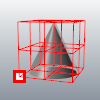
Minimum x, y, and z.
Cen
Uses the centroid bounding box x, y, or z point.
Set X, Y, and Z to Cen to use the "middle" of the bounding box as the pivot.
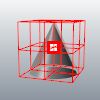
Center x, y, and z.
Max
Uses the maximum bounding box x, y, or z point.
Set X, Y, and Z to Max to use the "upper-right" corner of the bounding box as the pivot.
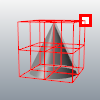
Maximum x, y, and z.
Use world CPlane
Uses world coordinates for the transformations.
Use current CPlane
Uses construction plane coordinates for the transformations.
Transform objects individually
Transforms each object from its own pivot point and bounding box.
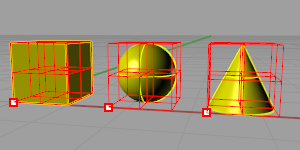
Individual bounding boxes and pivot for each object.
By default, selected objects are all contained in one bounding box and are transformed from one pivot point as one unit.
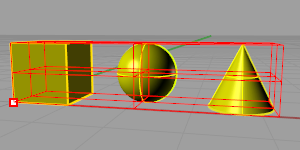
Single bounding box and pivot for all selected objects.
Show bounding box
Displays a control polygon that represents the bounding box.
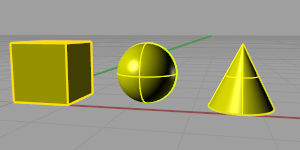
Bounding box off.
Copy objects
Transforms a copy instead of the original objects.
Select copied objects
Leaves the copied objects selected. This allows incremental changes to the copied objects.